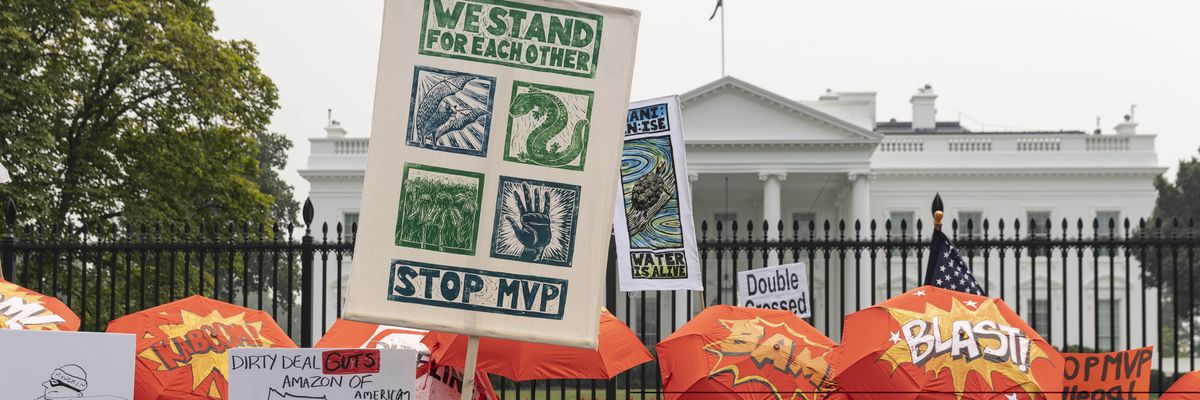Frontline climate campaigners renewed pledges to continue fighting against the Mountain Valley Pipeline on Tuesday, when U.S. federal regulators decided that MVP could
raise its gas transportation rates and have more time to build an extension.
"The federal government claims to recognize the urgency of the climate crisis while allowing the fossil fuel industry to further it,"
said Russell Chisholm, managing director of the Protect Our Water, Heritage, Rights Coalition, in response to the pair of Federal Energy Regulatory Commission (FERC) orders.
"During the past decade of repeated delay, budget increase, and environmental violation, thousands have resisted the reckless Mountain Valley Pipeline and its Southgate extension, and we are never going away," he vowed. "Our resistance is the fossil fuel industry's greatest nightmare; we are only growing more powerful."
"FERC's decision to extend MVP Southgate's certificate of 'public need'... is a crime against us and future generations."
MVP is set to cross 303 miles of Virginia and West Virginia, plus the Southgate extension into North Carolina. Largely thanks to outgoing U.S. Sen. Joe Manchin (D-W.Va.), language to expedite construction of the partially completed gas pipeline was included in the debt ceiling law that President Joe Biden negotiated with congressional Republicans this year.
The new FERC order allowing the rate hikes—which critics worry will be passed on to customers—notes that MVP now estimates construction will cost over $6.6 billion, rather than the earlier estimate of $3.7 billion. It also says that MVP, a
joint venture involving five energy companies, "asserts that the primary drivers of the increased costs were permitting delays caused by ongoing legal challenges to the project, which have persisted since construction began in early 2018."
Jessica Sims, Appalachian Voices
' Virginia field coordinator, responded that "the Mountain Valley Pipeline's delay and ballooned construction costs are owed to the company's insufficient planning and choice of route, deficient permit applications, and lax construction practices. The resulting violations, fines, permit vacations, and consent orders are of the company's own making and they should not have been granted permission to financially pass those mistakes on to consumers."
Along with the rate order, FERC Commissioners Mark Christie, Allison Clements, and Willie Phillips approved a three-year extension for MVP to complete the North Carolina project. Commissioner James Danly did not participate in the decisions and the commission's fifth seat is vacant.
Appalachian Voices North Carolina program manager Ridge Graham called the move "appalling" while Jason Crazy Bear Keck, co-founder of 7 Directions of Service, said that "we are extremely disappointed but never surprised by the results of a system created for profit."
"FERC's decision to extend MVP Southgate's certificate of 'public need,' which subjects our streams, rivers, and community members to seizing of land and irreversible pollution, against our will, with no proof of need, is a crime against us and future generations," Keck added. "We will never give up on defending our lives, and the natural environment that makes life possible."
MVP opponents highlighted that Democratic North Carolina Gov. Roy Cooper and other elected officials from the state have spoken out against the 75-mile extension, which was initially supposed to be completed this past June.
"This project is unnecessary for North Carolinians," said Emily Sutton of the Haw River Assembly, stressing the opposition from residents and officials including Cooper. "The health and safety of our communities and the Haw River watershed should not be jeopardized for the profits of fossil fuel interests. We will continue to fight to protect the people and places we love."
As FERC released its MVP orders on Tuesday, Appalachians Against Pipelines—which has been fighting the project for over five years—said that protesters are now "facing increased repression from the state and the companies behind the pipeline" and called for solidarity actions across the United States January 29-31 "to bring the fight to every company and bank involved."
"With every work stoppage, Mountain Valley Pipeline and their state collaborators have become more and more desperate to criminalize dissent," according to the group. "MVP is suing more than 40 activists across multiple jurisdictions in central Appalachia for millions of dollars. More than 20 pipeline fighters have been arrested on a variety of charges since this summer, including ludicrous abduction felonies."
Appalachians Against Pipelines declared that "we know why state and private forces are doing this—because they are terrified of the communities we have built, the fight we are waging, and because they know that we are unafraid and that we won't back down."



